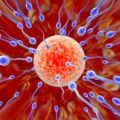
Two new studies appearing in the journal Human Reproduction seem to provide further evidence that environmental factors are adversely affecting men’s reproductive health. The studies suggest that environmental pollutants could be changing the ratio of sperm carrying the X or Y (sex determining) chromosomes and that they could be contributing towards male reproductive disorders.
The first study, by Swedish researchers, shows that exposure to persistent organochlorine pollutants (POPs) can affect the distribution of sex chromosomes in sperm, leading to a slight increase in the number of sperm bearing the Y chromosome. Aleksander Giwercman, professor of andrology at Malmö University in Sweden, and his colleagues looked at the effect of two POPs (CB-153 and DDE) on semen in a group of Swedish fishermen, aged between 27 and 67, some of whom fished off the east coast in the contaminated Baltic Sea, which has become heavily polluted by POPs.
The researchers found that both CB-153 and DDE in the blood of the fishermen was associated with an increase in the proportion of Y chromosome bearing sperm in semen, and that age, smoking and hormone levels had no effect. “When we compared the 20 percent of fishermen with the highest exposure with the 20 percent with the lowest exposure, DDE was associated with an increase of 1.6 percent in sperm with Y chromosomes and CB-153 with an increase of 0.8 percent. To our knowledge this is the first study to show that the distribution of the sex chromosomes in sperm can be affected by exposure to POPs,” said Giwercman.
The study was not designed to discover whether the increase in Y chromosome sperm would lead to an increase in boys being born. “We need a much larger population in order to investigate the implications of these changes on sex ratio of offspring as the number of children born to these fishermen was small. However, we think the fact that exposure to environmentally derived chemicals can change the sex chromosome ratio in sperm is worrying in itself and requires more attention from scientists and the public,” concluded Giwercman.
The second study, by researchers from Denmark, Lithuania and Finland, suggests that a higher than expected prevalence of cryptorchidism (undescended testes) in Lithuania could be occurring because changing environmental factors are affecting the reproductive development of male fetuses. Babies born with undescended testes are at higher risk of developing testicular cancer and of having infertility problems. Cryptorchidism is one of the symptoms of testicular dysgenesis syndrome (TDS) – a collection of male reproductive disorders, possibly caused by errors in development of the fetal testes. The Lithuanian study investigated over a thousand boys born in one hospital in Lithuania.
Dr Niels Jorgensen, one of the authors, said the study was significant because existing data on male reproductive health in Lithuania showed that the incidence of testicular cancer was one of the lowest in Europe and that semen quality in young men was good – a similar situation to that in Finland. “However, our results showed that the prevalence of cryptorchidism at birth in Lithuania was 5.7 percent, which was lower than in Denmark (9 percent), but higher than Finland (2.4 percent). These figures are not consistent with the data on semen quality and testicular cancer in the Nordic-Baltic region. Based on these data, we could have expected the frequency of cryptorchidism in Lithuanian boys to be similar to that in Finnish boys.”
Jorgensen and his fellow researchers wondered what could be the reason for the discrepancy between these different indicators for male reproductive health? “Recent data show that semen quality and testicular cancer development is probably determined during the fetal period, but clinically this is usually not detected until the third decade of life. Thus, the recent findings of good semen quality and low frequency of testicular cancer in Lithuania may reflect the intrauterine environment situation more than 20 years ago. However, cryptorchidism can be detected immediately after birth and therefore the prevalence of congenital cryptorchidism detected in this study may be a better reflection of the current environmental situation than semen quality and the incidence of testicular cancer. If the hypothesis is correct that TDS is caused by environmental conditions, possibly interacting with genetic factors, the question arises as to whether adverse changes in the environmental factors affecting male reproductive health have taken place in Lithuania in the last 20 years,” said Jorgensen.
The study found that cryptorchidism was associated with low birth weight, preterm delivery, small gestational weight and other congenital abnormalities of the genitalia. An interesting significant risk factor was the father’s weight; babies born to underweight fathers were six times more likely to have undescended testes. “This finding should be treated with caution because the number of cases was rather low and only larger studies will be able to show whether this is a genuine association or not,” cautioned Jorgensen.








Comments are closed.